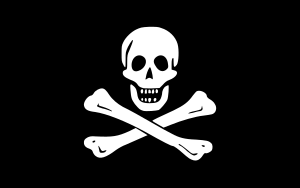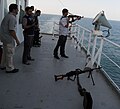Introduction

Piracy is an act of robbery or criminal violence by ship or boat-borne attackers upon another ship or a coastal area, typically with the goal of stealing cargo and other valuable goods. Those who conduct acts of piracy are called pirates, and vessels used for piracy are called pirate ships. The earliest documented instances of piracy were in the 14th century BC, when the Sea Peoples, a group of ocean raiders, attacked the ships of the Aegean and Mediterranean civilisations. Narrow channels which funnel shipping into predictable routes have long created opportunities for piracy, as well as for privateering and commerce raiding.
Historic examples of such areas include the waters of Gibraltar, the Strait of Malacca, Madagascar, the Gulf of Aden, and the English Channel, whose geographic structures facilitated pirate attacks. The term piracy generally refers to maritime piracy, although the term has been generalized to refer to acts committed on land, in the air, on computer networks, and (in science fiction) outer space. Piracy usually excludes crimes committed by the perpetrator on their own vessel (e.g. theft), as well as privateering, which implies authorization by a state government.
Piracy or pirating is the name of a specific crime under customary international law and also the name of a number of crimes under the municipal law of a number of states. In the 21st century, seaborne piracy against transport vessels remains a significant issue, with estimated worldwide losses of US$25 billion in 2023, increased from US$16 billion in 2004. (Full article...)
Selected biography -
Gan Ning (pronunciation) (c.early 170s - c. 220), courtesy name Xingba, was a Chinese military general serving under the warlord Sun Quan in the late Eastern Han dynasty. Originally a notorious pirate, he gave up the life of a marauder in the late 190s and became a subordinate of Huang Zu, the Administrator of a commandery in present-day east-central Hubei. Disheartened by Huang Zu's indifferent attitude towards him, Gan Ning eventually left Huang and made his way into Wu territory (present-day eastern and southeastern China), where he found his calling and became a military officer under the warlord Sun Quan. Throughout his years of service under Sun Quan until his death, Gan Ning fought in numerous battles for his lord, including the battles of Jiangxia (208), Red Cliffs (208–209), Xiaoyao Ford (214–215) and Ruxu (217). (Full article...)
Selected article -
Piracy in Indonesia is not only notorious, but according to a survey conducted by the International Maritime Bureau, Indonesia was the country sporting the highest rate of pirate attacks back in 2004. It subsequently dropped to second place of the world's worst country of pirate attacks in 2008, finishing just behind Nigeria. However, Indonesia remains deemed the country with the world's most dangerous water due to its high piracy rate.
With more than half of the world's piracy crimes surrounding the South-East Asia aquatic regions, the turmoil caused by piracy has made the Strait of Malacca a distinct pirate hotspot accounting for most of the attacks in Indonesia, making the ships that sail in this region risky ever since the Europeans arrived. The term 'Piracy in Indonesia' includes both cases of Indonesian pirates hijacking other cargo and tanks, as well as the high rate of practising piracy within the country itself. The Strait of Malacca is also one of the world's busiest shipping routes as it accounts for more than twenty-five percent of the world's barter goods that come mainly from China and Japan. Approximately 50,000 vessels worth of the world's trade employ the strait annually, including oil from the Persian Gulf and manufactured goods to the Middle East and Suez Canal. The success that stems from this trade portal makes the Strait an ideal location for pirate attacks. (Full article...)
Did you know?
- ... that indigenous Australian artist Daniel Boyd has depicted colonial figures including Captain James Cook and Governor Arthur Phillip as pirates?
- ... that the developers of Hotline Miami 2: Wrong Number suggested that Australian customers pirate their game?
- ... that Saudi Arabian broadcaster beoutQ pirated and resold beIN Sports programmes during the Qatar diplomatic crisis?
- ... that HMS Redpole, one of the aptly-named coffin brigs, sank in an action with a pirate vessel in August 1828?
- ... that Black Sheep Radio dedicated its first day of programming to a fallen pirate?
- ... that since 1904 the Gasparilla Pirate Festival in Tampa, Florida, has featured a pirate-themed parade?
- ... that in 2011, pirates were reported as raiding along the Danube River in the center of Europe?
- ... that there is only one account of walking the plank?
- ... that, unlike traditional Western societies of the time, many pirate clans operated as limited democracies, demanding the right to elect and replace their leaders?
Selected quotations
| “ | Come all you brave Boys, whose Courage is bold, Will you venture with me, I'll glut you with Gold? Make haste unto Corona, a Ship you will find, That's called the Fancy, will pleasure your mind. Captain Every is in her, and calls her his own; |
” |
| — A Copy of Verses, Composed by Captain Henry Every (1696) | ||
General images
Selected Jolly Roger

Subcategories
Topics
WikiProjects
Related portals
Things you can do

Contribute
- Work on piracy and pirate articles and help improve them to featured articles.
Expand
Join
WikiProject Piracy Requests
- eliminate red links from List of pirates
- expand Timeline of piracy, specifically to fill in vast gap between the 1890s to 2000s
- revise Bartholomew Roberts
- help with Requested articles and Expand articles
- help with Portal:Piracy
Associated Wikimedia
The following Wikimedia Foundation sister projects provide more on this subject:
-
Commons
Free media repository -
Wikibooks
Free textbooks and manuals -
Wikidata
Free knowledge base -
Wikinews
Free-content news -
Wikiquote
Collection of quotations -
Wikisource
Free-content library -
Wikiversity
Free learning tools -
Wiktionary
Dictionary and thesaurus









































































































